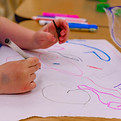
Local Planning Council
For Child Care Development
Nevada County
Across California, we are transforming our education system to meet the needs of all children and set them up for success in learning and life. UPK brings together Transitional Kindergarten (TK) and all existing state preschools and federal early education (including California State Preschools [CSPP] and Head Start), private childcare, and expanded learning opportunities, including before and after school programs into the same system.
What is UPK?
Universal PreKindergarten (UPK) is the expansion of the state’s mixed delivery system to meet the early education needs of 3- and 4-year-old children and their families. For too long, California's Early Learning and Care and TK-12 systems have worked independently. UPK is an opportunity to bring these systems together.
UPK can serve as a bridge between early childhood and TK-12 systems to increase students’ readiness for school and schools’ readiness for students so that all children thrive in school and in life. Early learning and TK-12 leaders can leverage their expertise to build a bridge and create a system that puts the needs of children and families first.
UPK is an essential part of transforming California’s schools and giving every student in California a great start.


P-3 system
PreK
TK
3 to 4 year-olds
Open to all 4s
0-3
K
1st
2nd
3rd
Early Learning and Care

TK-12 system
UPK aligns TK-3rd Grade curriculum with preschool curriculum to create a P-3 system. Updates to Preschool Learning Foundations are underway to support both CSPP and TK.
We envision a UPK system where:

Each child enters school thriving and ready to succeed in their educational journey.
All families, particularly in communities of color and in historically-marginalized communities, have high-quality early education opportunities and feel welcomed in early education spaces.
Families have more choices to select the PreK program that best fits their needs, without compromising their children’s access to learning opportunities.
Teachers are supported to provide experiences that nurture each child to reach their full potential.
Authentic partnerships among leaders of California’s tribal nations and TK-12 and early education leaders are formed to share knowledge and insight.
What's included in UPK:

Expansion of access to UPK programs for all 4-year-olds and more 3-year-olds

Access to two free meals each school day for all public education students in TK-12 regardless of income status

New expanded learning opportunities available during the summer and before and after school, building on existing programs

Increase to Early Childhood Mental Health Consultation reimbursement for California State Preschool Programs and other subsidized preschool providers, and expansion of supports for inclusion of more children with disabilities in UPK programs

Additional supports for more bilingual UPK programs, including tribal language revitalization programs and expansion of anti-bias training confronting hate, bigotry, and racism

Funding to support more districts and schools to work closely with teachers, students, families, and community partners to reduce barriers and increase access to services

Additional supports for UPK educators and leaders to increase early childhood knowledge and expertise across systems

Guidance for partnering with Tribal Governments, integrating Indigenous expertise, and engaging Indigenous community members in UPK implementation
Changes to California's existing PreK programs with UPK
Transitional Kindergarten (TK) is expanding to include more children every year and will soon be available for free to all 4-year-old children, regardless of family income or other child characteristics, at full implementation (in 2025-2026).
Eligible families can choose CSPP for their child even if their child is eligible for TK.
New reservation of slots for children with disabilities, paired with a requirement to serve a minimum of 5% through 2024-2025, 7.5% in 2025-2026, and then 10% after 2026-2027.
Extension of toddler reimbursement rate to more 3-year-olds.
Family language instrument development and implementation to support children's home language development.
These programs will continue to be critical partners for ensuring that families have authentic choices and that all children have access to the early learning opportunities they deserve.
Eligible families can choose Head Start or Private PreK for their child even if their child is eligible for TK.
Examples of LEA UPK Offerings
(Or a combination of scenarios)
Local community-based organization offers 8.5 hours of CSPP serving mostly 3-year-olds
Local Tribal Education Center offers 6 hours of Head Start
Provides additional 4 hours of extended learning and care
Local community-based organization offers 6 hours of Head Start
Partners with CSPP to offer an additional 4 hours of early learning and care
Local community-based organization offers 6 hours of CSPP
Partners with licensed early learning and childcare providers who have capacity and accept state vouchers to meet family needs for care
Family childcare home offers 8 hours of CSPP as part of a Family Childcare Home Education Network (FCCHEN)
Building on the partnerships that will make UPK a success, the work to align practices across the early elementary years will be ongoing and is critical to the ultimate success of all children.
